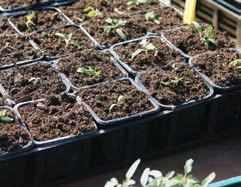









Natural Awakenings – Pittsburgh P.O. Box 390
Uledi, PA 15484
Phone: 724-271-8877
Publisher@naturalawakeningsswpa.com naturalawakeningsswpa.com
Publisher Michelle Dalnoky
Lead Editor Martin Miron
Production Assistant Joann Dalnoky
Design & Production C. Michele Rose
Sales & Marketing Michelle Dalnoky
Subscribe online to receive your FREE monthly digital magazine at naturalawakeningsswpa.com
Cover image by Andreas_Zerndl from Getty Images/CanvaPro
NATIONAL TEAM
CEO Kimberly B. Whittle
National Editor Sandra Yeyati
Editor Brooke Goode
Copy Editor/Proofing Melanie Rankin
Layout Flip180 Media
© 2024 by Natural Awakenings. All rights reserved. Although some parts of this publication may be reproduced and reprinted, we require that prior permission be obtained in writing. Natural Awakenings is a free publication distributed locally and is supported by our advertisers. Please call to find a location near you or if you would like copies placed at your business. We do not necessarily endorse the views expressed in the articles and advertisements, nor are we responsible for the products and services advertised. Check with a healthcare professional regarding the appropriate use of any treatment. CONTACT NATIONAL

Natural Awakenings Publishing Corporation 350 Main Street, Suite 9B Bedminster, NJ 07921 Ph: 239-206-2000
NaturalAwakenings@KnoWEwell.com

Space for AD
Natural Awakenings is a network of natural lifestyle magazine publishers empowering local communities with knowledge, resources and connections to lead healthier lives on a healthy planet.
Make a difference in your community. Become a Natural Awakenings franchise owner. Visit: Corp.NaturalAwakenings.com.














January | Health & Wellness


March | Food & Nutrition
April | Eco-Travel




February | Heart-Healthy Lifestyle





June | Men’s Health


May | Women’s Wellness
July | Keeping It Cool
August | Finding Your Tribe






September | Emotional Healing
October | Whole Body Alignment
November | Grateful Aging
December | Reconnect & Rejuvenate


























Three-Month Planner






I’m so excited this year to have ripening pawpaws on the trees that I planted five years ago. When I lived in Florida, I became a fruit tree grower because gardening there is nearly impossible, or at least it was for me. When you grow up gardening in the north and move to the south, the learning curve is huge. So, my answer, was to grow fruit trees and I love to grow trees from seed. It’s very satisfying.
At the Florida house, I grew jackfruit, soursop, custard apple, mango, loquat, avocado, fig, papaya, moringa, Barbados cherry and chaya spinach trees in a small yard that also had a huge old oak tree. I love the idea of a food forest, and when I moved back here in 2017, I was excited about the possibilities of planting food trees on the 6.5 acres my sister and I inherited. So I planted apple trees, peach trees, plum trees and pawpaw trees.















I had never heard of the pawpaw, but in researching it I found that it became the state fruit of Ohio in 2009. It is a native to the Eastern U.S. and can grow way up into Canada and down the entire east coast, which is amazing for a very tropical-tasting fruit. It bears a custardy, soft fruit when ripe, with a banana-mango flavor profile. Because it is highly perishable, it is not found in stores, but If you haven’t tried it, you should. It’s amazing.
Apparently, they were a favorite of native people and the likes of George Washington and Thomas Jefferson. In September, you can find them growing in the wild if anyone will tell you where they are, but you can also purchase them on Facebook Marketplace. The WVU Arboretum has a tasting in September and there are numerous festivals across Pennsylvania and Ohio. I save the seeds and plant them—covering my property with pawpaw trees. My original “patch” is seven trees and I have 18 ripening pawpaws this year for the first time, which I hand-pollinated with an artist’s paintbrush. I am beyond excited and will let you know how things turn out.

Michelle Dalnoky, RN, BA, Publisher









Once known for its industrial pollution, Pittsburgh’s amazing transformation over the last half-century has become a case study in sustainability. In 2023, it was recognized as one of the most climate-resilient cities in the United States.
The 2024 annual International City/ County Management Association (ICMA) Conference, held from September 21 through 25 at the David L. Lawrence Convention Center, will bring together local government professionals around the world to connect and learn from peers, focus on emerging trends and challenges and provide solutions to help them prepare for the future.
Pittsburgh is one of 25 cities chosen for its vision and leadership on climate action and is tackling carbon emissions through reducing building energy use, increasing renewable energy, reducing vehicle travel and electrifying vehicles.
Location: 1000 Ft. Duquesne Blvd., Pittsburg. To register, call 219-3546679 or visit Conference.ICMA.org/registration.

The ninth annual Pittsburgh Recovery Walk, an annual event celebrating the many roads to recovery from addiction and all those that travel them, will be held from 9 a.m. to 1 p.m., September 7, at 1201 Waterfront Place, in Pittsburgh. There will be speakers, a giant resource fair, the Pittsburgh Recovery Awards, kids’ activities, food trucks, music and a parade through Downtown Pittsburgh. Streets will close at 11 a.m. and walking will begin at 11:30.
The walk aims to celebrate recovery and recovery supports, eliminate stigma and showcase resources for recovery support, health and harm reduction in our region. The Pittsburgh Recovery Walk Steering Committee says, “We live in a time when addiction makes a lot of headlines, almost all of them negative. The damage is particularly acute in our backyard: western Pennsylvania has one of the highest overdose rates in the nation. The Pittsburgh Recovery Walk is an opportunity to reflect on the process and possibility of recovering from addiction.” It builds pride and hope, and all support is greatly appreciated.
Admission is free, funded solely through sponsorship contributions and other donations. Register at pghrecoverywalk.org/donate.

Daniel and Carole Kamin have given $65 million to the north side-based Carnegie Science Center, one of the four Carnegie Museums of Pittsburgh. It will be renamed the Daniel G. and Carole L. Kamin Science Center in their honor.

A Kamin Family Free Day from 10 a.m. to 5 p.m., September 1, will allow visitors to celebrate the end of summer while enjoying four floors of interactive exhibits, plus hands-on, outdoor activities with free general admission, courtesy of the Kamins. At MessFest, create giant bubbles, go head-to-head in a pie-eating contest and make a splash at the super science dunk tank.
Location: One Allegheny Ave., Pittsburgh. For more information, call 412-237-3400 or visit CarnegieScienceCenter.org/eventsand-programs.

Carnegie Mellon University will present the second annual hybrid IDeaS Conference: Disinformation, Hate Speech and Extremism Online from September 18 through 20 to advance the science of social-cybersecurity through research and applications. The conference will include invited panels, posters and regular talks. There will also be the opportunity for those interested to demonstrate their technologies. Participants and speakers can attend virtually or in person.
Natural disasters, elections, climate changes, insurrections, pandemics and new technologies are rocking the world. People talk about events online, and social media platforms, search engines and websites have become the window through which the events are viewed and interpreted. Those on social media seek and shape information, build and join communities, often with impacts in the physical world.
One consequence is an online breeding ground for growing and disseminating disinformation, hate speech and extremism. The conference asks how this is done, who is doing it, why it is being done, what the social consequences are and how it can be countered.
Registration at Tinyurl.com/IDEAS-conference.



While food addiction is not considered an official diagnosis, some people have a hard time controlling the amount of highly processed foods they consume. In research published in the journal Gut, scientists analyzed the microbiome bacteria of mice and humans with food addictions. They found that the bacteria in mice and humans with food addictions were different from their counterparts with a healthy food relationship. The food-addicted groups had lower levels of the beneficial Blautia bacteria and high levels of the detrimental Proteobacteria in their microbiomes. When the researchers increased the Blautia bacteria levels in the mice that had become compulsive eaters, the compulsive behavior stopped. While a correlation between the microbiome makeup and eating patterns has been identified, more research is needed to understand whether that relationship is a cause or a marker for compulsive eating.


As people become increasingly aware of their environmental footprint, planting native trees stands out as an impactful action. In addition to their beauty and shade, indigenous species offer numerous other benefits.
According to the National Wildlife Federation, loss of habitat is the primary threat to wildlife. The U.S. Department of Agriculture (USDA) recommends planting native vegetation to maintain a biodiverse, robust and resilient ecosystem. Because these varietals have evolved over centuries to adapt to the local soil and climate, they are hardy providers of essential shelter and food for an area’s wildlife.
The root systems of native trees play a vital role in maintaining soil health, helping to regulate soil temperature, prevent erosion and promote water infiltration. Native trees require less fertilizer and water than non-natives—of particular significance in drought-prone areas.
By sequestering carbon and reducing greenhouse gases, trees contribute to the fight against global warming. They also lower utility bills by shading the house in the summer while allowing the sun to warm it in the winter. Native trees are better equipped to withstand a region’s weather extremes, pests and diseases. The nonprofit American Forests suggests planting species that will be suitable for an area’s expected climate conditions in 30 to 50 years.
Native trees improve air quality by filtering pollutants. They also provide a sense of place and community. A neighborhood with abundant green spaces can enhance mental well-being by offering a natural retreat, especially in urban settings. Integrating native trees into community planning can foster a stronger connection between residents and their local environment, too.
• Select the right tree. Consult the USDA tool (PlantHardiness.ars.usda.gov), which predicts a tree’s resilience in light of current and future climatic variables. To ensure genetic diversity, select plantings that are grown from seed instead of cloned.
• Choose the right spot. Make sure the tree’s mature size will fit the available space.
• Mulch and protect. To support microorganisms, control weeds, hold moisture and help a young tree flourish, spread two to four inches of mulch in a ring extending to the tree’s drip line; avoid piling it against the tree trunk. To enrich the soil, choose organic mulch such as composted leaves or aged hardwood bark.
• Water wisely. Research the water requirements of the species. During the initial establishment period, it is important to provide adequate water without overdoing it.

by Kelcie Ottoes
Emerging sustainability initiatives such as renewable energy, greenwashing regulation, artificial intelligence (AI) applications and biodiversity programs are all being championed by stakeholders for the greater good of our planet.
Renewable energy is derived from natural sources, such as the sun and wind, that are replenished at a higher rate than they are consumed. In 2023, the U.S. Energy Information Administration reported that renewable energy made up 9 percent of total energy consumption from these sources: biomass waste, biofuels and wood (60 percent); wind (18 percent); solar (11 percent); hydroelectric (10 percent); and geothermal (1 percent).
The International Energy Agency predicts that renewables will provide more than a third of global electricity generation by early 2025—surpassing coal—due in large part to increasingly cheaper photovoltaic technology. The quest continues to improve the efficiency, cost effectiveness, adaptability and environmental footprint of existing solar panels. Advanced photovoltaics use innovative materials such as perovskites, organic and tandem solar cells, which may surpass the efficiency of traditional silicon-based solar cells. The use of floating solar panels and panels above or adjacent to agricultural production serves to minimize land use and increase opportunities for energy production. Flexible, transparent solar cells also
allow for their integration into a wider range of applications.
These advancements are also aided by improvements in energy storage. Lithiumglass batteries and redux flow batteries manage the intermittency of renewable energies like wind and solar better and have a lower environmental impact than other batteries. Flow batteries, in particular, show potential as a cost-effective, longterm storage solution.
Greenwashing is the practice of making a product appear to be more environ-
mentally friendly or less environmentally damaging than it really is, and new antigreenwashing laws are being promoted to help consumers make better choices. The European Union has banned environmental claims that are not supported by transparent, verifiable data. It also imposes strict regulations on potentially misleading terms such as “environmentally friendly”, “eco-friendly”, “green”, “biodegradable” and “carbon neutral”.
In a similar move intended to provide environmental transparency and oversight, the California Climate Corporate Data Accountability Act will require companies with more than $1 billion in revenues to report their direct and indirect emissions from energy consumption with third-party certification beginning in 2026. This information will be made public online.
AI is expected to play a larger role in fighting climate change. Some applications include:
• Identifying carbon inefficiencies within a supply chain to influence reduction strategies
• Improving the efficiency and mainte-

nance of renewable energy infrastructure, optimizing the management of the power grid, forecasting power consumption and managing energy distribution
• Supporting the agriculture industry by analyzing soil data, plant health and weather forecasting
• Boosting recycling rates by using AIpowered machines to sort materials to be recovered
These advancements in AI are not without cost. According to Nathan Childress, Ph.D, a nuclear engineer and CEO of Macorva, “AI’s voracious appetite for energy is straining power grids and causing some tech giants to miss their carbon reduction targets. This highlights a critical need for immediate action in expanding clean energy infrastructure to support AI’s growth.”
According to the Kunming-Montreal Global Biodiversity Framework, a United
Nations-led initiative, more than half the world’s population—4.3 billion people— depend on biodiversity and nature for their livelihood, with 70 percent of the world’s poorest and most vulnerable relying directly on nature for their everyday needs. And yet, biodiversity is dwindling at an alarming rate.
“Urbanization and deforestation lead to habitat fragmentation, while pollution—particularly plastic and chemical waste—degrades ecosystems,” says Abdullah Choudhry, chief impact officer at Arbor, a carbon assessment company.
“According to the World Wildlife Fund, wildlife populations have declined nearly 70 percent since 1970, highlighting the urgent need for comprehensive conservation efforts.”
To protect biodiversity, volunteers are teaming up with researchers on long-term ecological projects. The nonprofit Biodiversity & Development Institute, for example, enlists citizen scientists with smartphones to identify African mammal, aquatic, insect

and plant species for their Virtual Museum project. In Japan, the mobile application Biome was able to collect more than 6 million species observations with the help of the public. In a study published in eLife, scientists combined these citizen sightings with traditional data to improve ecosystem assessments and protected-area designations.
In a journal article published in BioScience, experts report a growing opportunity for citizen-led research in biodiversity, noting that people onsite are able to identify under-sampled species and help scientists gain a deeper understanding of ecological interactions among species or habitats. Offering hope for future generations, kids are also getting involved. The Biodiversity Group, in Arizona, offers a K-12 curriculum that encourages biodiversity stewardship at a young age.
Kelcie Ottoes is a copywriter and content creator specializing in sustainability and environmental topics.




by Marlaina Donato
September is National Mushroom Month, and with it comes bountiful inspiration to plate up some earthy goodness. Whether we follow the nearest woodland path to forage or visit the local market to stock up on our favorite fungi, autumn is the perfect time to appreciate the delicious world of edible mushrooms. From creamy vegan risotto to golden soups, or from daring sautés punctuated with chiles to savory broths, consuming more mushrooms benefits our palate and well-being.
The Mayo Clinic reports that mushrooms help curb high blood pressure and protect us from neurodegenerative diseases such as Alzheimer’s and Parkinson’s. Most mushrooms available at the market are a good source of B vitamins and minerals, especially selenium-rich creminis and vitamin D-rich maitakes.
A 2021 Penn State study published in Advances in Nutrition involving data of more than 19,500 cancer patients over several decades reveals that individuals consuming one-eighth to one-quarter cup of mushrooms daily had a 45 percent lower risk of total cancer compared to those that did not. It is believed that the antioxidants ergothioneine and glutathione—present in all mushrooms—contribute to beneficial metabolic processes in the body. Other research is focused on a correlation between white button mushroom consumption and a lower risk of prostate and breast cancer.
Mushrooms have been used as both nourishment and medicine for ages, but their versatility in the kitchen is what delights Sharon Palmer, a plant-based dietician and author of California Vegan and The Plant-Powered Diet. “You can sauté or grill them as a side
dish, stir them into soups and stews, add them to grain and pasta dishes, chop them into salads or bowls and include them in casseroles,” she advises. “Use finely chopped mushrooms in lentil patties, veggie burgers, veggie ‘meat’ balls and veggie loaves. You really can’t detect their texture, but you get that rich, savory flavor in the recipe.”
Palmer favors certain commonly available varieties: shiitake and trumpet mushrooms for their reliable, firm texture; oyster mushrooms for their delicate softness suited for stir fries; and petite enoki mushrooms for a crisp addition to salads. To obtain memorable flavor, gourmet varieties such as porcinis can be purchased dried and easily rehydrated for soups and sauces.
On the wilder side, foraged mushrooms such as golden chanterelles are an annual favorite among connoisseurs. “The mossy, old-growth forests of the Pacific Northwest
are some of my favorite fall destinations,” says Langdon Cook, a Seattle-based forager and author of The Mushroom Hunters, who recommends taking a foraging class or joining a mycological society for hands-on safety tips and in-the-field learning.
Cook notes that mushrooms are ideal for vegetarians and vegans because many varieties are firm in texture and pair well with vegetables. “Black trumpet or yellowfoot mushrooms take a basic dish of creamy polenta to the next level, and most grains and pastas will benefit from the addition of fungi,” he asserts. “Try a dry sauté method: heating the mushrooms in a bare pan until they release their water, cooking off that liquid and then adding butter or oil near the end of the cooking process to brown them.”
While mushrooms can dress up gourmet dishes, they are surprisingly quick and easy for everyday eating, too. “You don’t need to fuss over mushrooms too much,” Palmer points out. “Just rinse in water and pat dry; then you’re ready to cook with them. My favorite way to cook mushrooms is to slice and sauté them in a small amount of olive oil with garlic and lemon as a side dish.”
Cook advises, “Don’t try to cook mushrooms too fast or over high heat. Medium heat is fine. Take your time. Mushrooms are mostly water, and you need to cook off that liquid content to give them a nice sear.” He underscores the importance of cooking wild mushrooms fully to prevent digestive upset, especially morels, which “absolutely cannot be served raw or undercooked.”
YIELD: 2 SERVINGS AS A SIDE DISH
FOR POLENTA: FOR MUSHROOMS:
1 cup water, plus more as it cooks
½ cup milk
½ cup polenta
½ tsp salt
1 Tbsp butter
Parmesan cheese, grated, to taste

¼ lb (or more) wild mushrooms, roughly cut into pieces
2 Tbsp butter, divided
2 cloves garlic, minced
2 Tbsp porcini powder*, rehydrated with ½ cup warm water
1 Tbsp soy sauce
1 Tbsp heavy cream
1 tsp olive oil
Salt and pepper
* To make porcini powder, pulverize a store-bought package of dried porcini into powder with a spice grinder. Chicken or vegetable stock may be substituted for porcini powder.
Over medium-high heat, bring water and milk to simmer in a medium-sized sauce pan or pot. Slowly add polenta while whisking to prevent clumping. Season with salt and continue to whisk for a minute or two. Turn heat to low and cook for about 45 minutes, stirring occasionally. Add more water as necessary to maintain creaminess.
Palmer concurs, saying, “Eating raw mushrooms may cause mild GI [gastrointestinal] issues in some people; cooking the mushrooms typically eliminates this issue.” She also suggests covering the pot or pan when cooking them in soups or stews to lock in flavor and nutrition.
For Cook, the magical lure of mushrooms goes beyond the tastebuds. “To me, morels mean springtime trips to woodlands reawakening from winter slumbers with birdsong and snowmelt, and porcinis mean long summer hikes to subalpine meadows in the Rockies and North Cascades,” he says.
Marlaina Donato is an author, painter and recording artist. Connect at BluefireStudio.art.
While the polenta cooks, in a small pan sauté garlic and mushrooms in a tablespoon of butter over medium heat, stirring occasionally. Cook mushrooms until they release their water and then cook off liquid, allowing mushrooms to brown slightly; this might take several minutes. Season with salt and pepper.
Add ½ cup rehydrated porcini stock (or chicken or vegetable stock) to mushrooms. Continue to cook on medium heat until the liquid is reduced by half and then turn heat to low. Add soy sauce, cream and a drizzle of olive oil. Stir together and allow to thicken. Keep warm in pan over low heat while waiting for polenta to cook. If sauce becomes too thick, add another splash of water, cream or stock. Just before plating, melt one more tablespoon of butter into mushroom sauce and stir.
When polenta is thoroughly cooked and creamy, add butter and cheese (and more liquid if necessary). Adjust seasoning. Serve in a bowl and spoon mushrooms and sauce on top.
Recipe and photo courtesy of Langdon Cook.
by Sandra Yeyati
Aimie Apigian is a double board-certified physician in preventative and addiction medicine with master’s degrees in biochemistry and public health. As the founder of Trauma Healing Accelerated, she instructs individuals and practitioners on how trauma gets stored in the body and what to do once it creates a chronic health condition. Her signature methodology looks at the effects of trauma on cell biology, a missing piece in trauma therapy approaches. Patients begin with a six-week foundational journey before digging into deeper trauma work and the biology piece.
How do you define trauma and the trauma response?
Dr. Bessel van der Kolk uses three words to define trauma: overwhelming, unbelievable and unbearable. A trauma is something that overwhelms us in our ability to respond. We can’t believe it’s happening, and it’s so unbearable we disconnect from our body to not feel it—it’s things like loneliness, shame or abandonment. That’s why we numb, suppress, repress, distract or avoid. The body shifts from using energy to conserving it, so we only do the bare minimum to get through the day—and that includes thinking; many people will have decision fatigue. Also, the diaphragm loses its tone in the trauma response because our body goes into, “I’m going to breathe only enough to keep me alive.”
Why does trauma get stored in the body?
If there isn’t a completion of the trauma response, then the body will hold onto that trauma. The nervous system never gets that completion that says, “That was awful, but it’s over now.” The brain never stores it as a memory of the past, which means that it’s always in our present moment. When our whole biology continues to operate in fear, this can affect our hormones, immune system, digestion and cardiovascular system. Without a reset back to safety, we stay in danger mode and the body will close down at the cellular level.
During the first week of my foundational journey, I have people learn seven somatic exercises intended to help them create an
immediate felt sense of feeling safer in their body. So no matter where they are—at the grocery store, at home—if they lose their sense of safety, they have tools in the moment to get it back.
Can you give an example of a tool?
Bring your hands up as close to your shoulder as possible and imagine there’s this huge boulder in front of you. Start pushing it away, going as slow as you can. It’s not easy; you’re going to feel your arm muscles because you’re pushing hard. When you get to full extension, pause and wait for a few seconds. There are changes happening in our body, and it takes time for that message to travel up our vagus nerve to our brain stem to register. Take notice of any changes in your body. You might feel a sense of release. You might have this deep breath come that you didn’t plan for.
Once we create that felt sense of safety, the body is opening up, and now it needs to feel support or it’s going to go back into trauma

response. I lead people through the process of creating a felt sense of support. Here’s an example: Put your hands over your heart, one on top of the other, and push in quite a bit. A really deep breath comes for me; that’s how my body gives me the message that this is nice for me. Experiment and move your hands around—sometimes we can do it higher, more centered, over to the side—and find the spot that feels the nicest for your heart.
We each have a current capacity for how much we can hold at the moment without being overwhelmed, and I want to build my capacity so that a year from now I’m able to hold more. For many people in my courses, when they feel a lot of joy, then tears, sadness and grief seem to come, so it has been safer for them to just not feel much joy. To expand into your capacity to experience joy, you can’t go all the way immediately. You’ve got to find a safe amount of joy that you can have today that feels manageable, and then use a tool so that tomorrow you can feel a little more joy and still feel safe. We do this titrated or paced expansion, staying safe enough as we grow.
If we don’t complete a trauma response, there’s going to be a part that is still stuck there in that moment of danger, kind of not knowing that we survived. In parts work, I teach people how to know their major parts in order to stabilize their system. Your inner critic, for example, is a major part that we’ve got to work with pretty soon, because otherwise your critic will continue to shame you and get you into trauma response. I guide people to notice how these parts show up in the body. Next time you feel something familiar in your body, you know, “That’s my inner critic,” and it doesn’t scare or frustrate you anymore. You’re like, “Oh, hello.” That is a true mind-body connection.
Sandra Yeyati is national editor of Natural Awakenings. To read a longer version of this conversation, visit Tinyurl.com/ApigianNA or scan the QR code.


by Carrie Gauthier
Trauma can strike anyone at any time. Loss, heartbreak, abuse, violence, displacement, accidents, disasters, health problems—the list of possible traumas is endless. According to the National Council for Behavioral Health, 70 percent of adults have experienced at least one traumatic event in their lives, and more than a third of youth exposed to community violence experience post-traumatic stress disorder (PTSD). Trauma is a factor in most behavioral health and substance-use disorders. While trauma may be part of our lives, it does not need to define who we are or how we enjoy our lives. Healing from trauma can take time, but it is within reach.
Left untreated, trauma or repeated trauma has a wide range of short- and long-term effects on physical and mental health. Trauma increases stress and keeps the fight-or-flight response on elevated alert, resulting in the release of chronically high amounts of cortisol into the body. Initial reactions may include exhaustion, numbness, sadness, anxiety and dissociation. Excessive cortisol increases the risk of serious health conditions such as heart disease, digestive problems, muscle tension, headaches, sleep issues, weight gain, irregular periods, anxiety, depression and cognitive challenges.

Trauma is a common precursor to addiction, because individuals often turn to substances as a coping mechanism for their emotional pain. The use of drugs or alcohol gives trauma sufferers a reprieve from their chronic stress by producing pleasure and reducing negative feelings, and may even slow their central nervous system. Untreated, trauma can lead to a vicious cycle where one condition feeds the other.
While medications such as antidepressants and antipsychotics can be effective in treating trauma symptoms, they may fall short in addressing the root cause. An integrative approach to trauma healing adds evidencebased therapies to tackle the underlying causes and promote long-term recovery.
James Greenblatt, a board-certified functional and integrative psychiatrist and founder of Psychiatry Redefined, believes in a broader view of psychiatric care. “For example, if our patient is suffering from depression and we were to tell them they should exercise because it’s the best antidepressant we have, that could come off as incredibly insensitive, ruin our chances of gaining their trust and add to their feelings of helplessness and isolation. Alternatively, if we show them how to recover their motivation and energy, that is the way to begin the relationship.”
“Our bodies are different, and our genetics are different. How we react to stress and trauma are different too. I start with lab and genetic tests to see if there’s something I can optimize biologically. Then we supplement any nutritional deficiencies to restore their functionality and increase their energy. These tests also partially help inform the way we design the complementary healing modality plan. This is the piece that gets missed a lot,” says Greenblatt, adding that he tests depressed patients for a vitamin B12 deficiency, which may contribute to depression, anxiety and even psychosis.

Children are particularly susceptible to trauma, and an adverse childhood experience (ACE) can pose lifelong impacts. According to the U.S. Centers for Disease Control and Prevention, 64 percent of adults say they have had at least one ACE, and 17 percent say they had four or more by age 18. ACEs can rob kids of the magic of childhood, disrupt their development and lead to maladaptive behaviors in adulthood.
Aimie Apigian, a double board-certified physician in preventative and addiction medicine and founder of Trauma Healing Accelerated, started her work with attachment and trauma by working with adoptive families to help their children with attachment insecurity. She explains that childhood traumatic experiences can result in “underlying mistrust—literally wiring a child’s nervous system, brain and body for survival—and overwhelm connection, security and safety.”
Somatic therapy is one modality that Apigian integrates to assist individuals on their trauma-healing journey, helping them connect with their bodies, learn to understand its messages and resolve stored trauma. Apigian explains that just 10 minutes of sequential somatic exercises over 21 days can restore a sense of safety. “For each person, the specific improvement or the degree of improvement will be different, but there will be an improvement as soon as we shift our biology into one of safety rather than of danger.”
By following an essential sequence to safely address stored trauma through somatic exercises, Apigian says people “experience 30 percent less depression, 30 percent less
anxiety, 30 percent fewer digestive issues, 30 percent improvement in energy and a 60 percent increase in their feelings of safety. The essential sequence has to start with creating a felt sense of safety, then a sense of support and then opening up while pacing our process. It is such a powerful way to empower them for their lifetime.”
Inner-child work can help develop a dialogue to reach the place where we hold past emotions, memories, beliefs, hopes and dreams. “I tell people when they’re starting this journey, if they put their hands on their belly above and below their bellybutton and just let the hands be there, that will calm down an aspect of us so that it begins to feel safe. It’s called the basic self,” says Dr. Lin Morel, a trauma management specialist and founder of Beyond Words Group. “It’s an aspect of our consciousness that is roughly 5 years old, if you were to give it an age. So it gets very fearful, and if it’s not loved, it will act out.”
According to Morel, embracing the basic self can help people out of some of the darkest corners of trauma. No stranger to childhood and adult trauma herself, she empowers her patients with the W.I.N. protocol (willingness, intention, neutrality), which offers them a fresh approach to handling challenges while developing their intuition and regulating emotions as a neutral observer.
There is growing evidence that mindfulnessbased practices such as meditation and yoga aid in shifting focus from the negative to the positive aspects of experiences. These techniques calm the nervous system and empower individuals to take control of their narratives and become more resilient.
A 2017 review of trials involving 650 trauma sufferers that underwent mindfulnessbased stress reduction, yoga and mantra repetition was published in Psychological Trauma: Theory, Research, Practice, and
Policy. The researchers concluded that meditation was an effective treatment for PTSD and depression symptoms as compared to the control groups.
A 2022 systematic review of 149 records and 11 peer-reviewed articles published in the International Journal of Environmental Research and Public Health found that those that practiced yoga had an increased sense of self-compassion, felt more centered, developed coping skills, had a better mind-body relationship and improved their relationships with others. Participants also experienced a feeling of safety in yoga classes that included others recovering from trauma.
Hypnotherapy is a mind-body practice that uses a trance-like state of deep relaxation to treat psychological and emotional disorders. Guided imagery, progressive relaxation and suggestion therapy are used to explore thoughts, feelings and memories that may be hidden from the conscious mind. Selfhypnosis techniques are also taught for ongoing support, empowering individuals to continue their healing outside of therapy sessions. A 2016 meta-analysis published in the International Journal of Clinical and Experimental Hypnosis concluded that hypnosis is effective in alleviating PTSD symptoms.
“A miracle, simply, is a shift in the mind. Once you find the root cause of the problem in the mind and bring that to consciousness, we’re shifting from ego to true self, from fear to love, from illusion to truth,” says Matthew Brownstein, executive director of the Institute of Interpersonal Hypnotherapy. “Through hypnotherapy, that shift is actually remarkably easy. You can shift as quickly as I can snap my fingers. So, basically, when you change your mind, everything changes. When a decision is made, it stays in place until you choose again.”
Carrie Gauthier is a writer in the healing arts with interests in clinical and transpersonal hypnotherapy.
by Carrie Gauthier
The first known reference to yoga is in the Upanishads Sanskrit texts, written 2,500 years ago. The practice originally comprised breath work, and the physical postures developed over time. According to the global data platform Statista, nearly 34 million Americans practice numerous types of yoga, while science continues to provide evidence of its healing potential.
With the frenetic pace of life today, many people live in a permanent state of anxiety. Yoga can ease the panic and malaise by activating the parasympathetic nervous system to decrease stress hormones, blood pressure and heart rate.
“Yoga therapy differs from traditional psychotherapy in scope and aim. Rather than delving into traumas, yoga empowers individuals to be present, moving away from personal narratives,” says Adam Flores, a certified yoga therapist from Port St. Lucie, Florida, specializing in addiction and mental health. “Trained yoga therapists offer grounding techniques and skillful checkins, especially for trauma cases, improving heart rate variability, vagal tone and overall nervous system health.”
A 2011 meta-analysis study published in Primary Care Companion for CNS Disorders indicates that yoga may be an effective

treatment option for severe mental illness, with the added advantage of being less toxic than pharmaceutical treatments.
Post-traumatic stress disorder (PTSD) is a significant issue facing the U.S. military and a growing problem for teens that have experienced violent or traumatizing events. Conventional treatments such as cognitive behavioral therapy and eye movement desensitization and reprocessing have shown limited effectiveness due to high dropout and nonresponse rates. On the other hand, studies have found that engaging in yoga and other mind-body practices can reduce intrusive memories, avoidance and emotional arousal symptoms, as well as anxiety, depression and anger associated with PTSD.
Yoga therapy improves critical factors in addiction recovery, including emotional balance, mental clarity and stress reduction. In a 2021 study published in the Journal of the American Board of Family Medicine, yoga for the treatment of substance abuse disorder was determined to be an effective option.
Yoga has developed into a variety of styles that can meet the goals and objectives of their practitioners. Some of the more popular formats include:
• Vinyasa: An up-tempo class of postures or poses (asanas) often accompanied by high-energy music that typically results in a consistently elevated heart rate. A 2017 study published in The FASEB Journal found that eight weeks of vinyasa yoga improved physical fitness, relieved stress and improved mental well-being.
• Yin: This form of yoga focuses on gentle, passive stretches held for one to three minutes, offering ample opportunity to release stress and tension. Poses are often supported by props such as bolsters, straps, blocks, pillows and blankets. Long, slow, deep breathing promotes relaxation to help the practitioner hold
each pose for extended periods of time. Yin yoga stimulates and stretches fascia, the thin connective tissue throughout the body, as well as ligaments and joints, resulting in increased flexibility.
• Hatha: This is a classic yoga style involving breathing exercises and poses that are held for longer periods of time than other formats. Although the slower, more meditative pace may seem easier, holding a proper pose for extended periods of time can be challenging for the body and mind. According to a 2018 study in the International Journal of Preventive Medicine, 12 sessions of hatha yoga significantly reduced stress, anxiety and depression in women.

• Kundalini: This yoga style prioritizes spiritual growth and awareness, with a focus on energy and chakras. Kundalini awakenings are common via movement sequences, breath work, mantras and chanting. Different studies in 2021 found that kundalini yoga is an effective short-term therapy for generalized anxiety disorder
and can be helpful in reducing the severity of insomnia.
One of the core tenets of a yogic practice is self-compassion, and it is important to resist the inclination for negative self-talk. To adopt the yogic way is to choose happiness over suffering.
“In my experience, the best healing experiences happened by tapping into the body and unlocking the energies we hold onto,” says Paty Renda, a certified Ananda hatha yoga instructor and co-owner of Premah Wellness, in Fort Lauderdale, Florida. “I believe in serious work done through fun exercises such as breath, dance, laughter and movement. A simple, slow and deep hatha yoga practice can create profound changes. Gratitude is another very easy, and yet immensely powerful, practice I infuse into everything I do.”
Carrie Gauthier is a writer in the healing arts with interests in clinical and transpersonal hypnotherapy.

by Swamini Shraddhananda Saraswati
The purpose of yoga therapy is to aid the body, mind, spirit in maintaining overall health, reconciling the effects of trauma, resolving or reconditioning injury and navigating illness. The process involves the application of mind-body practices focusing on physical, emotional and mental well-being. Whether one is a child, adult, elder, athlete, office worker or medical patient, yoga therapy offers techniques that meet individuals where they are and provides meaningful benefits.
Yoga therapy benefits everyone, not just those that are sick or injured. For example, regular visits to a yoga therapist can help athletes avoid injuries and perform more optimally. Couples can learn to establish healthier communication, and children can adopt practices that support healthy self-esteem and emotional regulation.
One obstacle to well-being that yoga therapy uniquely addresses is stress. Stress is a major factor in illness, disease and a decreased quality of life. Elevated stress levels can increase vulnerability to injury, illness and disease, as well as lead to unhappiness, impatience, anger, hopelessness, loneliness, fatigue and lethargy. When stress and its effects are managed, reduced, or in some instances alleviated all together, quality of life improves.
Adults suffer from stress. People that experience high levels of constant stress are more likely to suffer from biological illnesses. A large portion of the adult population deals with elevated stress and anxiety due to busy lives, unresolved trauma, relationship or workplace difficulties, or recurring illness or injury. Research as recent as 2023 and 2024 indicates that yoga therapy improves well-being and supports coping skills that reduce the experience and impact of stress. Additionally, yoga therapy has been shown to reduce symptoms of depression and improve sleep. Davies, Faschinger, Galante and Van Dam found that meditation, relaxation and guided imagery have significantly increased over the last 20 years as methods to address stress and anxiety.
Children suffer from stress. Today’s children face health challenges due to violence, bullying, excessive computer use, poor diet, lack of sleep and busy lifestyles. These factors contribute to increased anxiety, stress and depression. Research has found that yoga-based interventions have become quite popular and are effective in teaching children skills to mitigate the physical, mental and emotional effects of stress. Yoga therapy studies involving children consistently show increased positivity and improved well-being, including as an adjunct to medical care for those with psychiatric conditions.
Elders suffer from stress. Elders face stressors related to aging, such as losing friends and loved ones, reduced independence, loneliness,

social isolation, financial instability and limited access to preventive medical care. Studies have shown that yoga therapy is statistically significant in reducing the impact of stress and elevating overall mood and sense of wellness in the elder population and is generally considered a low-cost intervention compared to healthcare costs. Because yoga therapy can be tailored to gentle or more energetic practices, it is well-suited for the varied needs of older individuals.
What practices alleviate stress. Yoga therapy includes techniques such as meditation, concentration, breathing exercises, postural practices, visualization, relaxation, mantra and mudra, as well as scriptural study, digestive cleansing and lifestyle practices. A yoga therapist has specialized training in the application of one or more of these techniques and should, therefore, be able to relate the benefits and contraindications of any technique they instruct.
Because each person’s needs are unique, yoga therapy is more individualized than uniform. Even in a class of 10 students, a skillful yoga therapist addresses each student’s needs individually. This approach helps practitioners feel cared for and can alleviate the sense of isolation and fear of unimportance that often accompany stress.
Students, especially those with complex health concerns, should initially avoid strenuous, complicated yoga practices and focus on slower, gentler techniques that allow them to learn mindfully. The effectiveness of yoga therapy is related to a student’s awareness of how they feel and their beliefs about their feelings. Students benefit from yoga therapy the most when they possess a sincere desire for change toward greater health and happiness and are willing to do the necessary work.
Yoga therapy is meant to complement, not replace, medical care. Individuals should consult their doctor before starting any physical practices.
Swamini Shraddhananda Saraswati is the founder of Kula Kamala Foundation and Yoga Ashram. She is a yoga therapist and Ayurvedic counselor, teacher of Advaita Vedanta, nondual spirituality, the wisdom of the divine feminine, yoga and meditation. For more information, visit KulaKamalaFoundation.org.
by Marlaina Donato

One of the most beautiful aspects of youth is envisioning the future with undaunted optimism, but even the most strategic plan for life can go off the rails. Whether we carry the weight of unprocessed trauma and never quite reach our potential or zoom into the fast lane of success only to be brought down by sudden change, pain is part of every person’s story. The quest for healing and finding our whole self beneath the rubble becomes a new objective that can be the most arduous but the most significant.
We might accomplish monumental feats, transforming our trauma or going into physical remission from disease. We might even feel a calling to guide others along the path we have come to know so well, but it is important to remember that the deep healing process is a spiral. Our linear brains may be startled when our most gut-wrenching, seemingly resolved issues loop back around, and we are plunged even deeper into the crucible. During these times, it is easy to forget that we are multidimensional beings. A physical injury or illness involves much more than flesh or organ systems, and agonies of the spirit can greatly impact the physical body.
We heal layer by layer—sometimes even layers within layers—and despite our full commitment and steady growth, the task of peeling the onion is never quite finished. One of our greatest challenges is overcoming the illusion that we are failing miserably when we fall out of resonance; evolution is not a course that we can flunk. With each descent, our pain can provide an opportunity to lessen the chasm between mind and body and to acknowledge parts of our being that might need tending. For as long as we inhabit a human vehicle, we will always be in the process of healing something, and that is okay. We can rest assured that our process, like all spirals, will lead us safely back outward to continue our journey.
Marlaina Donato is an author, artist and musician. Connect at BluefireStudio.art.

by Christina Connors
The mental health of our children is in crisis. According to the U.S. Surgeon General’s 2021 advisory on the youth mental health crisis, one in five children aged 3 to 17 has a mental, emotional, behavioral or developmental disorder. To turn the tide on mental health, kids need emotional regulation skills, including the ability to identify emotions, self-soothe, obtain perspective, walk in another’s shoes, think flexibly and solve problems. By developing these emotive sensitivities, children can then improve their self-confidence, sense of self-worth
and empathy, as well as begin to develop lasting and meaningful relationships.
“Kids will learn to regulate in the face of challenge. The only question is whether they learn healthy or unhealthy ways to do it,” says Brad Chapin, a licensed clinical psychologist in Topeka, Kansas, and author of self-regulation resources for children. “Removing challenges from children isn’t the answer. The focus should be on building self-regulation skills, and then those challenges become opportunities for strengthening those skills.”

In the words of lyricist Stephen Sondheim, “Careful the things you say / Children will listen.” Janet Philbin, LDSW, a certified, conscious-parenting coach and author, says, “When people become parents, they will tell you they want to parent differently than how they were parented because of the emotional childhood pain they endured. However, generational patterns will more than likely repeat unless the parent has done the emotional work to deconstruct their own childhood pain through coaching or counseling. As a result of doing the necessary inner work, a parent’s ability to connect with their children will improve because they are able to be more connected with themselves.”
“When we choose to look at behavior issues as a lack of skill-development, it changes the story from one of shame and negativity to one of hope,” says Chapin, whose recent book Self-Regulation Skill Set supports adults in their journey to self-regulation.
As with learning any new skill, practice is key. Here are a few fun activities for parents and children to do together to strengthen connections and build emotional regulation skills. Teaching kids when they are young is ideal, but it is never too late to start.
I Spy: While in a store, on a walk or at a park, challenge each other to notice the body language and facial expressions of people (or themselves) and identify the emotion they might be feeling. This game is a way to practice the skill set of recognizing warning signs when we start to feel upset. Parents should encourage their kids to take notice of the different expressions their peers make while at school to develop empathy and compassion.
The Paws (Pause) Game: To play, the first person who sees a dog says, “paws”, takes a calming breath and puts their
hands out like paws. The person with the most points at the end of the excursion wins. This game develops the skill of slowing down the alarm system within our bodies. Parents and caregivers can remind kids that throughout the day when they start to feel their own warning signs of anger or frustration, they can take a breath and “paws” to help prevent acting in a destructive way.
Balloon Party: In this game, parents invite their kids to sit comfortably with them and imagine that they are all preparing for a big party and need to blow up lots of balloons. While blowing up pretend balloons, remind each child to blow them up slowly so they don’t pop. After blowing up several balloons, enjoy a pretend party. This is a fun way to connect with children through imaginative play while practicing peaceful breathing, which helps calm the nervous system.
Christina Connors is a writer, singer and creator of Christina’s Cottage, a YouTube series to strengthen kids’ resilience, connection and joy through music, mindful play and the power of the heart. Learn more at ChristinasCottage444.com.










by Ruth Roberts, DVM, CVA, CVH, CVFT, NAN
Pet therapy, also known as animalassisted therapy (AAT), has long been recognized for its therapeutic benefits across a range of mental health conditions, including post-traumatic stress disorder (PTSD). Psychiatric service dogs are empathetic in nature and intuitively respond to human emotions. These capacities allow them to provide comfort and support precisely when it’s needed, often without the need for verbal communication. These dogs are not just pets but vital partners in the journey toward mental and emotional healing.
Interacting with psychiatric service dogs can reduce anxiety and stress levels by increasing the release of oxytocin, a hormone associated with bonding and stress reduction, while decreasing cortisol levels, which are linked to stress.
Psychiatric service dogs provide a calming presence, which is crucial for reducing anxiety and hypervigilance, common symptoms of PTSD. A study published in Frontiers in Psychology involving 134 veterans with
service dogs found that trained skills such as calming and interrupting anxiety are highly valued by veterans with PTSD, suggesting their critical role in daily PTSD management. The study also noted that untrained behaviors of the dogs are often perceived as more beneficial than their trained tasks, highlighting the intrinsic value of simply having a dog as a companion.
A 2022 study of 82 post-9/11 military veterans published in PLOS ONE reported that their psychiatric service dogs helped them with PTSD by performing calming actions and interrupting the veterans’ disturbing behaviors and thoughts during anxiety episodes. Researchers noted that all of the tasks the dogs had been trained to perform were used daily by the veterans, providing benefits for nearly all PTSD symptoms, except amnesia and reckless behavior. The humananimal bond and untrained qualities, such as companionship, also significantly improved the participants’ symptoms and quality of life.

Psychiatric service dogs enhance emotional regulation and improve social interactions for PTSD sufferers. Their non-judgmental and accepting nature creates a safe space for individuals to explore and manage difficult emotions. Additional research reported in the European Journal of Psychotraumatology demonstrated significant improvements in emotional and attentional regulation among adolescents with PTSD that were asked to participate in a one-year dog-training program.
While the therapeutic benefits for the handlers are significant, the European Journal of Psychotraumatology study also noted that the dogs in the training programs exhibited increased anxiety and decreased attention. This highlights a critical aspect of AAT: The welfare of the animals must be considered alongside the therapeutic benefits. Training programs need to ensure that the dogs are not overly stressed or burdened by their roles.
Prospective handlers of psychiatric service dogs should choose programs that prioritize the well-being of both dogs and humans through training, support and follow-up care. Engaging with a psychiatric service dog is a significant commitment that requires handlers to invest time in training and bonding with their dogs, as well as managing their emotional and physical needs to ensure a mutually beneficial relationship.
Understanding the legal rights pertaining to psychiatric service dogs, including accessibility in public spaces and accommodations, is crucial. Handlers should educate themselves about local and national laws that protect their rights and those of their service dogs.
Obtaining a psychiatric service dog involves careful consideration of the therapeutic benefits versus the potential stress on the animal. Look for reputable programs that train dogs to assist individuals with PTSD, while also prioritizing the welfare of the dogs and properly matching dogs and handlers.
The integration of psychiatric service dogs into mental health care offers more than just companionship; it opens a dynamic pathway for healing and managing PTSD symptoms. As we continue to explore and understand the unique bond between humans and animals, it becomes increasingly clear that dogs are not only cherished pets but also invaluable partners.
Ruth Roberts is an integrative veterinarian and holistic health coach for pets, as well as the creator of The Original CrockPet Diet. Learn more at DrRuthRoberts.com.




Therasage is the gold standard for energy healing, naturally healing infrared, negative ions and eliminating EMFs.
Therasage.com
Scan to register for educational webcast to learn more.


A NEW fun and interactive series dedicated to the health and well-being of Preschoolers and their families.
WORLD MUSIC, MOVEMENT, MINDFULNESS, CREATIVE PLAY, TIME IN NATURE & POWER OF THE HEART! SUBSCRIBE today!
Scan to learn more and subscribe.


Founded in 1932, Boiron, the world leader in homeopathic medicines, is best known for its popular Arnicare® line of pain relievers and Oscillococcinum® flu reliever.
BoironUSA.com
Save 20% with code NA20



OB/GYN-formulated
Rejuvenates vaginal tissue, restores natural moisture, and helps prevent bladder leaks.
DrAnnaCabeca.com/ products/julva

Sunday, September 1
Kamin Family Free Day at the Carnegie Science Center – 10am-5pm. Hosted by Carnegie Science Center. Donors Daniel and Carole Kamin donated $65 million to Carnegie Science Center, to be renamed the Daniel G. and Carole L. Kamin Science Center. Free Day includes four floors of interactive exhibits, hands-on and outdoor activities. Daniel G. and Carole L. Kamin Science Center, One Allegheny Ave. Info 412237-3400.
Tuesday, September 3
Pawpaw Party at Garden Dreams – 4:306:30pm. Hosted by Grow Pittsburgh. Sample local pawpaws. $Donation at Eventbrite. com/E/Paw-Paw-Party-At-Garden-DreamsTickets-950081708967. Garden Dreams, 806 Holland Ave. Info at GrowPittsburgh.org.
Wednesday, September 5
Webinar: Vultures – Gross but Great –5-5:45pm. Hosted by Allegheny Land Trust. Sept 7th is International Vulture Awareness Day. Celebrate these misunderstood but important birds by investigating their biology and their role in our ecosystems. $Free. Link: US02Web.zoom.us/J/ 83952553369. Info at AlleghenyLandTrust.org.

Friday, September 6
Friday Family Walk & Craft Day – 10amNoon. Hosted by West Virginia Botanic Garden. Learn about nature and enjoy the garden with a short walk, short story, and a simple craft. $Free/members, $15/family for non-members. Info and tickets at WVBG. org. 1061 Tyrone Rd, Morgantown, WV. 304322-2093.
Reiki Speaks: Developing Your Intuition Through Reiki – 6 Week, 15-hour Intensive Experience – Sep 6 thru Nov 15, 6-8:30pm. Hosted by Visions Reiki and Soul Spa. Prerequisite: Reiki I. A soulful experience with Reiki Master Wendy Borne through the
step-by-step process of connecting to and communicating with spirit. Registration $260 for all six sessions at Eventbrite. com/e/Reiki-Speaks-Developing-Your-Intuition-Through-Reiki-Tickets-780542833627. Visions Reiki and Soul Spa, 206 Alexander Ave, Strabane. 724-745-1785.
Saturday, September 7
9th Annual Pittsburgh Recovery Walk –9am-1pm. Hosted by Pittsburgh Recovery Walk. Celebrate the many roads to recovery and the many people who have traveled them. There will be speakers, a resource fair, kids’ activities, food trucks, music, dancing, and a parade. $Free registration and info at Eventbrite.com/e/2024-Pittsburgh-Recovery-Walk-Registration-875299232567. 1201 Waterfront Place, at the intersection of 11th and Waterfront Streets in the Strip District. Info at PGHRecoverywalk.org.
Nutrition Education w/Royally Fit: Blending Seasonings, Featuring Turmeric – 5:307pm. Hosted by Grow Pittsburgh. Focus on Turmeric as a healing crop used in many ways. Tickets $10 at Eventbrite.com/E/ Nutrition-Educatin-W-Royally-Fit-Bl;eding-Seasonings-Featuring-Tumeric-Tickets-950173282867. Garden Dreams, 806 Holland Ave. Info at GrowPittsburgh.org.
26th Annual Ohio Pawpaw Festival – Sept 13-15 various hours. Hosted by Zero Waste Event Productions. Fun-filled educational community event highlighting the rich history and future possibilities of pawpaw. Presentations on growing, cooking, genetics, medical use, and the pawpaw cook-off and pawpaw-eating contest. Free parking. Tickets $60/weekend pass, $20/Friday, $30/ Saturday, $20/Sunday. 12 and under free. Military and senior discount. Ohio Pawpaw Festival, 9794 Chase Rd, Albany, OH. Info at OhioPawpawFest.com.



Saturday, September 14
Poplar Island Pumpkins Opening Day Festivities – 11am-10pm. Hosted by Poplar

Island Pumpkins. Opening Day activities include vendors, corn maze, mini hayrides, cryptid trail, pumpkin patch, baked goods and more! Poplar Island Pumpkins, 260 Poplar Island Rd, Fairmont WV. Info 304951-7101.
Tuesday, September 17
Pawpaw Party at Garden Dreams – 4:306:30pm. Hosted by Grow Pittsburgh. Sample local pawpaws. $Donation at Eventbrite. com/E/Paw-Paw-Party-At-Garden-DreamsTickets-950081708967. Garden Dreams, 806 Holland Ave. Info at GrowPittsburgh.org.
Wednesday, September 18
2nd Annual Hybrid IDeaS Conference: Disinformation, Hate Speech and Extremism Onlione – two-day event about advancement of the science of social-cybersecurity through research and applications. Attend virtually or in person. The conference will include invited panels, posters, and regular talks. Registsration $325/general, $250/ PostDoc researcher or student at Regpack. com/reg/templates/iframe/index.php?g_ id=100915153. Info at CMU.edu.
Thursday, September 19
Painting with Plants: Making and Painting with Watercolors from the Garden – 5:307pm. Hosted by Grow Pittsburgh. Learn to make pastel pigments from flowers, then apply them with watercolor techniques. Tickets $10 at Eventbrite.com/E/PaintingWith-Plants-Making-And-Painting-WithWatercolors-From-The-Garden-Tickets950085931597. Garden Dreams, 806 Holland Ave. Info at GrowPittsburgh.org.
Summer Concert Series: Chris Haddox – 6:30-8:30pm. Hosted by West Virginia Botanic Garden. Chris Haddox spins tales that leave you laughing, smiling, crying, and sometimes perplexed. Bring a blanke or camp chair. $5/members, $10/non-members. Tickets and info at WVGB.org. 304322-2093.
Cleansing & Purification Sound Bath Meditation Workshop – 7-9pm. Hosted by The Brauer Institute for Holistic Medicine. Part of the Empowered Living Series – The art of Living Well. Step into your power, live your best life, thrive. $115/early registration, $135/after 16 Sept. Register at BrauerInstitute.com/Event/ Cleansing-Purification-Workshop-2/. The Brauer Institute for Holistic Medicine, 300 Mount Lebanon Blvd, Suite 220. Info at BrauerInstitute.com.
Saturday, September 21
The Essence of Sound Healing: Art, Science, and Tradition – 9am-6:30pm. Hosted by Rooted in Sound. Introductory course demystifying sound healing, delving into therapeutic applications and rich historical roots across multiple cultures. Tickets $250 at RootedInSound.com/Event-Calendar/TheEssence-Of-Sound-Healing-Sept21. Rooted in Sound, 209 Commercial Ave.

2024 International Sustainability Conference – Sep 21-25 various times. Hosted by International City/County Management Association Pittsburgh. Local government plays a vital role in shaping the communities they serve by planning for the future in infrastructure, education, public safety and more. Join local professionals from around the world to connect and learn, focus on emerging trends and prepare for the future. Registration $1790 (half price with ICMA membership) Conference.ICMA.org/Registration/. Held at the David L. Lawrence Convention Center. Info 219-354-6679.
Sunday, September 22
Duncansville Pawpaw Festival – 9am-4pm. Hosted by Duncansville Community Days and Ecotopian Earthcare/Restoration Landcare. Blair County’s first Pawpaw festival. Fresh pawpaw to try, smoothies at the Juice Shack, cultivated trees and wild seedlings for purchase. $Free event at Duncansville Memorial Park, 828 8th Ave, Duncansville. Info 814-227-3815.
Mushroom Walk – 2-4pm. Hosted by West Virginia Botanic Garden. WVU Prof. of Mycology Dan Panaccione will lead a search for forest fungi. Learn to identify native mushrooms. $5/members, $15/non-members. WV Botanic Garden, 1061 Tyrone Rd, Morgantown WV. Info at WVBG.org.
Tuesday, September 24
Pawpaw Party at Garden Dreams – 4:306:30pm. Hosted by Grow Pittsburgh. Sample local pawpaws. $Donation at Eventbrite. com/E/Paw-Paw-Party-At-Garden-DreamsTickets-950081708967. Garden Dreams, 806 Holland Ave. Info at GrowPittsburgh.org.
Thursday, September 26
Pawpaw Festival – York County, PA. – Sep 26-28, various hours. Hosted by Horn Farm Center. The Wild & Uncommon Weekend where the centerpiece is all things pawpaw in a regional celebration highlighting the diverse ecosystem of local foods, makers, and experience of York County. Local ven-
dors, food trucks, plant nurseries, educational activities. Tickets range from $7/general admission to $15/VIP with parking, and $20 premium VIP. Tickets and info at TicketLeap. Events/Tickets/Horn-Farm-Center/Pawpaw-Festival#. Horn Farm Center, 4945 Horn Rd, York, PA. 717-757-6441.
Saturday, September 28
How to Start a Community Garden – 10am4pm. Hosted by Grow Pittsburgh. Workshop focusing on organizing, people power building, and community engagement aspects of a community garden. Topics include design, build process, and growing techniques. Explore a Wilkinsburg community garden and connect with other community gardeners. $20 at Eventbrite.com/E/How-To-Start-ACommunity-Garden-Tickets- 952699528937. Garden Dreams, 806 Holland Ave. Info at GrowPittsburgh.org.
Indian Creek Watershed Festival – 10am-? Hosted by Mountain Watershed Association. Free fishing for kids, eco-art and craft activities, free lunch for kids, games & prizes, fly-fishing clinic by Trout Unlimited, Indian Creek Duck Race! At the Indian Head Creek near Resh’s Park, Normalville. Info at MtWatershed.com.
West Virginia Annual Pawpaw Festival – Noon-5pm. Hosted by West Virginia University Core Arboretum. Celebrate a native fall fruit. Family-friendly and free. Free parking in adjacent WVU Coliseum parking lot.



AIHM, SCU & CORNERSTONE COLLABORATION Invite You to the FIRST ANNUAL WHOLE HEALTH CONFERENCE BRINGING WHOLE HEALTH TO LIFE
OCTOBER 25-27, 2024
San Diego | Paradise Point Resort & Spa


SCAN FOR TICKET


Sample and purchase pawpaw, hear author Andrew Moore discuss his new book on Pawpaws, purchase pawpaw trees and other native plants. Live music, food trucks and more. WVU Core Arboretum, Beechurst Ave, Morgantown WV. 304-293-0387.
Fern Hollow Nature Center Fall Music Festival – 4-8pm. Hosted by Fern Hollow Nature Center. Featuring Mystic Knights | Dad Band and the Aviva Brick Oven Pizza food truck. Need more info on ticket prices. Minor must be accompanied. Fern Hollow Nature Center, 1901 Glen Mitchell Rd, Sewickley. Tickets and info at FHNC.org/FMF2024.
(Exact dates to be announced)
Earn Your Holistic Reflexology Certification (300 Hour) – Hosted by the Brauer Institute for Holistic Medicine. Enroll now for the October 2024 cohort. Grow your confidence as a wellness provider; make a positive impact on your clients’ lives. Serving Greater Pittsburgh, Morgantown, Wheeling, and Youngstown. 412-925-0812. Info at BrauerInstitute.com.
Hatha/Tantra Yoga with Lesley Eckenrode – 11am-12:15pm. Hosted by Visions Reiki and Soul Spa. Advanced class with challenging pace for those with prior yoga experience. $15. Register at VisionsReikiAndSoulSpa. com/yoga.
Art as Therapy – 1-3pm. 2nd and 4th Sunday. Hosted by Atithi Studios. Unlock the therapeutic potential of artmaking. All disciplines and levels. Pay what you can to keep this program going. Registration required: AtithStudios.com/programs. 412-301-5374.
The Writer’s Club – 1-3pm. 1st and 3rd Sunday. Hosted by Atithi Studios. All experience levels. Explore writing through discussions, feedback circles, prompts, and creative exercises. Pay what you can to keep this program going. Registration: AtithStudios.com/programs.
Community Acupuncture Circle – 2-4pm. 3rd Sun. Hosted by Sterling Yoga. $40/half hour. Sterling Yoga, 393 Vanadium Rd Suite 201. SterlingYoga.com.
Sound Healing in the Salt Cave with Patrick Keddie – 4-5pm. 1st Sundays. Hosted by Sterling Yoga. $25. Sterling Yoga, 393 Vanadium Rd Suite 201. SterlingYoga.com.
Sunday’s Restorative Rejuvenation –5-6:30pm. 3rd Sun. Hosted by Morgantown Power Yoga. All levels welcome. Learn to use breath, props, and focused awareness to decrease stress and anxiety in the body and the mind. Compliment your power yoga practice with restorative rejuvenation. $25.

235 Spruce St, Morgantown, WV. Tickets: Clients.MindBodyOnline.com.
The Poetry Atelier – 6-8pm. 1st Sunday. Hosted by The Space Upstairs. A series of sharing writings and writing processes, with writers invited to read their work, workshop their shared submissions, and experiment together in invented group exercises. Open and inclusive respectful forum. Drop-ins welcome. $5 suggested donation. 214 N Lexington Ave. 412-225-9269.
Monday
Mindful Mondays Youth Yoga – 5:456:30pm. Hosted by The Space GBG. Ages 8-15. $15. Registration and info at Sites. Google.com/TheAlignedMindStudio.com/ The-Aligned-Mind-Studio/Home. The Space GBG, 203 Old State Route 30, Greensburg. 724-672-3294.
Reiki Share at Visions Reiki and Soul Spa – 8:30-9:30am. 4th Monday. Free. Hosted by Visions Reiki and Soul Spa. Donations accepted. Experience healing, high vibrations, joy and fellowship of Reiki gatherings. Register at VisionsReikiAndSoulSpa.com/event/ Reiki-Share-At-Visions-Reiki-And-SoulSpa-24. Visions Reiki and Soul Spa, 206 Alexander Ave, Strabane.
1 Hood Power Hour – 7-8pm. A virtual public affairs forum hosted by 1 Hood Power to discuss all things political in SWPA and beyond. Featuring elected officials, policymakers and thought leaders. Building people-centered political power. 617-517-7600. Facebook. com/1HoodPower.
Tuesday
Chair Stretch I Yoga – 11-11:45am. Hosted by Sterling Yoga and Wellness Center. Online or in person. $12 at SterlingYoga.PunchPass.com/Classes. Also offering meditation, mindfulness, massage, reflexology, reiki, active salt room, infrared light and color therapy. Sterling Yoga, at the Davis Professional Building, 393 Vanadium Rd Suite 201 & 202. SterlingYoga.com.
Hatha / Tantra Yoga with Lesley Eckenrode – 11am-12:15pm. Hosted by Visions Reiki and Soul Spa. Introductory class with focus on learning poses, correct alignment and link-
ing breath with the asanas. $15. Register at VisionsReikiAndSoulSpa.com/yoga/.
Exercise for Parkinson’s – 1:30-2:30pm. Online or in studio. Hosted by Sterling Yoga and Wellness Center. $12 at SterlingYoga.PunchPass.com/Classes. Also offering meditation, mindfulness, massage, reflexology, reiki, active salt room, infrared light and color therapy. Sterling Yoga, at the Davis Professional Building, 393 Vanadium Rd Suite 201 & 202. SterlingYoga.com.
Guided Meditation and Energy Healing in the Salt Cave – 6-7pm. Hosted by Salt of the Earth. Recline in an anti-gravity chair amidst soft music, trickling water, and detoxifying Himalayan salt air during guided meditation to surrender stress and worries. Tickets $55 at Clients.MindBodyOnline.com/Classic/WS. 504 Valley Brook Rd, McMurray. 724-260-0472.
Yoga Level 2/3 – 6-7:15pm. Online or in studio. Hosted by Sterling Yoga and Wellness Center. $18 at SterlingYoga.PunchPass.com/Classes. Also offering meditation, mindfulness, massage, reflexology, reiki, active salt room, infrared light and color therapy. Sterling Yoga, at the Davis Professional Building, 393 Vanadium Rd Suite 201 & 202. SterlingYoga.com.
Flute Circle Gathering – 7-8pm. Last Tuesday of the month. Hosted by Rooted in Sound. Join fellow music enthusiasts in a celebration of harmony and community, whether you’re a seasoned flutist or a curious beginner, we’ll create a unique symphony of connection. Tickets $10 at RootedInSound. com. Rooted in Sound, 209 Commercial Ave, Aspinwall. 412-609-8999.
Market on the Farm – 3-6pm. May 1st through October 30th. Harmony Acres Dairy, 355 Perryopolis Rd, Belle Vernon. HarmonyAcresDairy.com
THRIVE Carmichaels Community Garden Project Meeting – 6-7pm. 2nd Wednesday. Hosted by Domestic Violence Services of Southwestern PA. Attend in person or via Zoom. Fellowship Hall, 101 W South St, Carmichaels. Info 724-223-5477.
Gentle Yoga in the Salt Cave with Erin –6:30-7:15pm. 3rd Wednesday. Hosted by Sterling Yoga. $25. Sterling Yoga, at the Davis Professional Building, 393 Vanadium Rd Suite 201 & 202. SterlingYoga.com.
Baby Loss Support Group – 6:30-7:30pm. 3rd Wednesday. Hosted by Pittsburgh Bereavement Doulas for people who have experienced miscarriage, stillbirth, medical termination, or death of a baby. RSVP to this free event. Donations welcome. EventBrite. com/e/Baby-Loss-Support-Group-Tickets-709518939247. The Space GBG, 203 Old State Route 30, Greensburg. 724-672-3294. Reiki Share at Visions Reiki and Soul Spa – 6:30-8:30pm. 2nd Wednesday. Free. Hosted by Visions Reiki and Soul Spa. Donations accepted. Experience healing, high vibrations, joy and fellowship. Register at
VisionsReikiAndSoulSpa.com/event/ReikiShare-At-Visions-Reiki-And-Soul-Spa-24. Visions Reiki and Soul Spa, 206 Alexander Ave, Strabane.
Evening Yoga in the Garden – 6-9pm. Wednesdays through 25 September. Hosted by West Virginia Botanic Garden. Join us on the event lawn for an all-levels vinyasa flow class. All ages. Tickets $12/$15 members/ nonmembers at FlipCause.com/Secure/ Cause-PDetails/MTg4OTI4. Class pack of 10, $100/$130 members/nonmembers. WV Botanic Garden, 1061 Tyrone Rd, Morgantown, WV. Info WVBG.org. $35 at RootedInSound. com/Event-Calendar.
Inner Rituals | The Poer of Your Voice – 7:309pm through 18 Dec. Learn to use Nada Yoga practice to access your inner soul scape. $35 at RootedInSound.com/Event-Calendar. Rooted in Sound, 209 Commercial Ave, Aspinwall. 412-609-8999.
Yoga Classes – 9:30-10:30am. 1st & 2nd Thursdays. Hosted by Spruce Street United Methodist Church. All ages and abilities with variations to accommodate health and movement issues, with students sitting or standing next to a chair. Emphasis on meditative practices. Wear comfortable clothing. 386 Spruce St, Morgantown, W Virginia. 304292-3359.
Sound Bath Thursdays – 7:30-8:30pm. Hosted by Rooted in Sound at Green Heiress. One of the world’s oldest wellness practices, sound healing creates space for a deep meditative state using gongs and Himalayan singing bowls to send vibrations throughout your body. Registration required, $30 at RootedInSound.com/Event-Calendar. Green Heiress, 209 Commercial Ave.
Intermission: The Artful Happy Hour –6-9pm. Third Thursday. Hosted by August Wilson African American Cultural Center. Bring your favorite co-worker and enjoy live music, crafted cocktails and specialty hors d’ oeuvres. Unwind while you tour the galleries and chill on the patio. 980 Liberty Ave. 412-339-1011.
Y12SR Relapse Prevention Group – 8:159:30pm. In person and online, hosted by Yoga Recovery Pittsburgh. Recovery services for those seeking holistic relief from addiction. Join Yoga for 12-Step Recovery on Thursdays at Yoga Factory Pittsburgh (space limited) and online. Complete member form, sign waiver, and register for session at YogaRecoveryPGH.com. $Donation requested. Yoga Recovery Pittsburgh, 3418 Penn Ave.
First Friday Walk/Hike – 10-11:30am. First Friday. Hosted by Allegheny Land Trust at various interesting parks and green areas around greater Pittsburgh. For info on location, focus, and cost go to AlleghenyLandTrust.networkforgood.com/events. 412-741-2750.

First Friday Family Walk – 10am-Noon. First Friday. Hosted by West Virginia Botanic Garden. Enjoy a short story followed by a walk around the Garden, conclude with a simple craft. Trail accommodates off road strollers. Members/free, $15/donation per family suggested. Preregistration required: wvbg.org or Forms.donorsnap.com/form.
Friday 101 – Carnegie Science Center Fab Lab Public Workshops – 1-2pm. Hosted by BNY Mellon Fab Lab Carnegie Science Center. Take a crash course in maker technology – learn the basics of 3D printing, laser cutting, vinyl cutting, and more. $30/nonmembers, $25/members. One Allegheny Ave. 412-2373400. Register: CarnegieScienceCenter.org.
Reiki Guided Meditation at Salt of the Earth – 4-5pm, 1st Friday. Hosted in the Himalayan salt cave at Salt of the Earth. Balance your energy and raise your vibe in guided meditation and reiki healing with Wendy Bourne. Tickets $55 at Clients.MindBodyOnline.com. Salt of the Earth, 504 Valley Brooke Rd, McMurray. 724-260-0472.
Lit Fridays – 6pm on the last Friday of each month via Facebook Live and Zoom. Hosted by the August Wilson African American Cultural Center (AWAACC), Lit Fridays is a literary-focused, virtual salon featuring conversations and guest performances moderated by AWAACC Literacy Curator Jessica Lanay. Find info for each session at AWAACC.org/ Series/Lit-Fridays. AWAACC, 980 Liberty Ave. 412-339-1011.
Kitty Bingo – 7:30-9pm. Hosted by Kitty Queen Cat Rescue. All proceeds support the cat shelter. Tickets $25 at Eventbrite. com/e/706706436977. Kitty Queen Cat Rescue, 4552 McKnight Rd Suite 400. KittyQueenCatRescue@gmail.com.
Saturday
Morgantown Farmers Market – 8:30-Noon. Through Nov 16th. Fresh, local food and farm products. 400 Spruce St, Morgantown, WV. Info at MorgantownFarmersMarket.org.
Sound Bath Saturdays – 11am-Noon. Hosted by Rooted in Sound at Green Heiress. One of the world’s oldest wellness practices, sound healing creates space for a deep meditative state using gongs and Himalayan singing bowls to send vibrations throughout your body. Registration required, $35 at RootedInSound.com/Event-Calendar. Green Heiress, 209 Commercial Ave.
All-Levels Vinyasa Flow with Sarah – 1011am. Hosted by Gritstone Climbing and Fitness. Get your Zen on and bliss out with this gentle yet challenging flow. Member/ nonmember pricing and packages available. Tickets at ClimbGritstone.com. 1901 Eljadid St, Morgantown, WV.
3D Printer Workshop – Noon-2pm. Hosted by Prototype PGH. Learn to use the Elegoo UV Photocuring 3D resin printer. $10 at Eventbrite. 460 Melwood Ave, Oakland. Info: PrototypePGH.com.
Prototype PGH – Monthly Open House –Noon-2pm Second Saturday. Learn about Prototype and the events, workshops and services offered. Donations appreciated to cover free events and workshops. 460 Melwood Ave #208. RSVP on our Facebook page.
Second Saturdays at the Space Upstairs – 8-11:45pm. Hosted by The Space Upstairs. Begun in 2007, Second Saturdays are the signature jazz happenings at the Space Upstairs. Lightbulbs and couches, coffee tables and deconstructed pianos, vivid splashes of light and projection. Poetry scribbled on the walls. Improvisational postmodern jazz dance by the Pillow Project. Modern speakeasy magic and spontaneous art. A sober event serving several house-infused waters, specialty iced coffees and seasonal drinks for donation at the Space Bar. $15 at the door. 214 N Lexington Ave. 412-225-9269.
Fee for classifieds is a minimum charge of $20 for the first 20 words and $1 for each additional word. To place an ad, email Publisher@naturalawakeningsswpa.com.
ADVERTISING SALES – Natural Awakenings magazine is looking for experienced advertising salespeople covering the Greater Pittsburgh area, SW Pennsylvania and Morgantown WV to help others grow their natural health & wellness and sustainable living or green businesses. Commission-based. Full- or part-time. Paying 25% commission. Unlimited potential income. Be a part of something magical! Send resume to Michelle: Publisher@ NaturalAwakeningsSWPA.com.
READING POETRY RELAXES – Inquire at: wewuvpoetry@hotmail.com or P.O. Box 4725, Pittsburgh, PA 15206-0725.
Connecting you to the leaders in natural health care and green living in our Pittsburgh community. To find out how you can be included in the Community Resource Guide, email Publisher@naturalawakeningsswpa.com to request our media kit.
PANTHER FUNCTIONAL MEDICINE AND CHIROPRACTIC
Dr Danielle Marra, DC
Murrysville • Greensburg
724-387-1014 • PittsburghHealthPro.com

Dr. Danielle Marra has nearly 20 years’ experience helping patients regain their health through conservative and holistic approaches utilizing functional medicine, chiropractic, diet modifications, and nutritional support. The practice provides advanced lab testing, allergy relief, spinal decompression, CDL physicals, massage therapy, thermography and more. Their philosophy is treating the root of your symptoms, naturally. See ad, page 7.
SUSANMERENSTEIN,BSPHARM,RPH, HOLISTIC CLINICAL PHARMACIST
4227A Murray Ave, Pittsburgh 412-421-4996 • LabNaturals.com VitalHealthPharmacist.com

Founded by Holistic Clinical Pharmacist Susan Merenstein, LabNaturals offers an anti-aging line of skincare products that are safe, non-toxic and affordable. The company also carries a line of people- and pet-friendly CBD products and offers Vital Health consultation services on functional health and hormone balance.
PANTHER FUNCTIONAL MEDICINE AND CHIROPRACTIC
Dr. Danielle Mara, DC Murrysville • Greensburg 724-387-1014 • PittsburghHealthPro.com

Dr. Danielle Mara has nearly 20 years’ experience helping patients regain their health through conservative and holistic approaches utilizing functional medicine, chiropractic, diet modifications and nutritional support. Plus advanced lab testing, allergy relief, spinal decompression, CDL physicals, massage therapy, thermography and more. Their philosophy is treating the root of your symptoms, naturally. See ad, page 7.
THE KEFIR CHICKS
Connellsville, PA
TheKefirChicks.com
TheKefirChicks@gmail.com Facebook.com/TheKefirChicks

Kathy and Haley, The Kefir Chicks, are two chicks on a mission to bring awareness to everyone about whole foods and gut health through whole, probiotic-packed food medicine –water kefir. See ad, page 6.
OLD THYME HERB SHOP, LLC
Lisa Cunningham Old-Fashioned Family Herbalist 308 Liberty St, Perryopolis, PA 724-736-2400

Nothing fancy here; just hundreds of organic bulk medicinal herbs at your beck and call. Heal yourself ~ help others. In service and gratitude always. No Facebook, no website, no social media. Not enough thyme! Just you and I and your blessed healing herbs.
NUTRADENTIST
Dr. Mark Buzzatto 2555 Washington Rd, Ste 620 Upper St. Clair, PA 15241 412-831-9700 • nutradentist.com

Dr. Mark Buzzatto is a biological dentist who takes a holistic approach to your health. The use of whole food nutrition, biocompatible materials, essential oils, chromotherapy, sound, and spa services create a warm and relaxing environment, and comprehensive care for your family.
LABNATURALS, INC.
Susan Merenstein, Pharmacist/Owner 4227-A Murray Ave, Pittsburgh 412-586-4678 • LabNaturals.com

LabNaturals, Inc. is a Holistic Health Apothecary and sister business to Murray Avenue Apothecary. Hormone testing and balancing, CBD, absorbable Acetyl Glutathione and non-toxic skincare are offered at LabNaturals, Inc. We offer one-on-one private consultations.
MELANIE KRNETA

DIP HOM. ACH, Reiki Master 1252 Liberty St, Franklin, PA • 814-428-9895 Facebook: Melanie Krneta Homoeopathy Plus Classical homoeopathic consultations providing individualized care for the entire family. Migraines, hormonal imbalances, PTSD, grief, arthritis, digestive imbalance. Reiki sessions are beneficial for relaxation and pain management. Other services provided are far infrared sauna with medical grade color therapy and Himalayan salt and ear candling.
WHY KNOT WELLNESS LLC 7500 Brooktree Rd, Wexford 412-501-3239 • WhyKnotWellnessLLC.com

Our massage therapy services focus on people living with a cancer diagnosis past or present, those with chronic illness such as fibromyalgia, anxiety, TMJ/TMD, chronic pain, or migraines, as well as caregivers. We offer oncology massage, therapeutic massage, reiki, scar tissue massage, lymphatic drainage, and spontaneous muscle release technique in our approach to helping you find better health and relaxation. See ad, page 11.
MEDMJ HEALTH
Dr. Irina Staicu, DO 267-337-8944 • office@medmjhealth.com
Children see magic because they look for
it.
—Christopher Moore

Telehealth medical cannabis evaluations and personalized recommendations regarding product choice with a state-approved physician. Chronic pain, anxiety, PTSD, cancer, glaucoma, inflammatory bowel conditions, HIV, autism, seizures, multiple sclerosis, etc. An alternative option for many sources of medical ailments and bodily imbalances.
NAPTURAL BEAUTY SUPPLY
724-307-8487
NapturalBeautySupply.com

Naptural Beauty Supply was created to end the stigma around natural hair by empowering men and women to love themselves naturally. We do this by instilling confidence in our community and increasing convenience by having the tools and services in one place, such as hair and body butters, beard care and apparel. We are beauty supply with naturals in mind!
DR. ARETI, LLC
Dr. Areti Fitsioris
421 Cochran Rd, Pittsburgh
412-419-1537 (call/text)
Facebook.com/Dr.Areti

Dr. Areti is a board-certified naturopathic physician who implements manual therapy, lifestyle medicine, nutritional analysis, and non-invasive methods to address functional and structural imbalances – services are 100% grounded in evidence-based science. She goes the extra mile to identify and address root causes of conditions and to provide ongoing support.
ORGANIC INSPIRED WITH ZOE
Zoe Morris-Almasi, Organic Stylist
Now available at Creative Hair Solutions 2853 Oxford Blvd, #101, Allison Park, 151012 412-492-1688

Everyone deserves a healthier option for their haircare and salon services. Organic hair care gives you the option to maintain a healthy lifestyle and look your best. More than 10 years of experience and passion for the industry. See ad, page 15.
HOLISTIC REFLEXOLOGY
CERTIFICATION PITTSBURGH
The Brauer Institute for Holistic Medicine
Dorit Brauer, Founder and Owner Carnegie, PA • 412-925-0812

Learn and achieve the highest level of knowledge in Holistic Reflexology, Energy Medicine, Personal Development, Ancestral Strength and gain a holistic view of the world.
SACRED, CENTERED, YOU, LLC 412-258-0766 • SacredCenteredYou.com

Leza is known widely for her abilities as a sound healer, inspirational speaker and interfaith spiritual counselor. Healing arts services include vibrational sound healing, past life and soul regression, journey work counseling and conscious relationships counseling. Private and group services offered. Lesa Vivio, MS, LPC, CMHIMP, DDiv, DSM.
GROW PITTSBURGH
Raqueeb Bey, Garden Resource Coordinator 6587 Hamilton Ave, Ste 2W, Pittsburgh 412-362-4769 ext 215 • GrowPittsburgh.org
Raqueeb@GrowPittsburgh.org

Grow Pittsburgh is an urban, agriculture nonprofit that teaches people how to grow food. They envision the day when everyone grows and eats fresh, local and healthy food. Get involved. Take a tour, become a member, learn, volunteer! Visit their website for workshops and events.
ROOTED IN SOUND
Wyatt Melius 2000 Smallman St, Pittsburgh 412-609-8999 • RootedInSound.com

Sound massage, Nada yoga, forest bathing, and acoustic-induced meditation. Check the calendar for sound baths on Sundays and Thursdays. See ad, page 7.
412-258-0766
SacredCenteredYou.com

Offering individual and group experiences that promote healing through self-discovery and personal acceptance. Special focus on sound healing, life coaching, qigong, and vibrational medicine.
You are never too old to become younger!
—Mae West
360 CAFÉ LLC
Tyleda Worou Pittsburgh • 724-374-8089 • 360Cafellc.com

360 Café LLC is an alternative health and wellness business with the goal of helping others to heal from the inside out while taking a holistic approach to healing by offering distance reiki, and crystal healing sessions to help our consumers restore physical and emotional balance.
Himalayan Salt Cave and Crystal Boutique 504 Valleybrook Rd,McMurray, PA 15317 724-260-0472 • SaltOfTheEarthPgh.com

Experience the known ancient healing benefits of halotherapy in the Himalayan salt cave, built from 16 tons of pure Himalayan salt. 45-minute sessions scheduled on the hour. Can be rented for private groups up to 10. Provides an inviting and relaxing environment for events and classes: yoga, meditation, sound healing, and reiki. The crystal boutique offers an array of authentic crystals, jewelry, candles, locally-made bath and body, and Himalayan salt products. The knowledgeable staff will help find the right crystal for you or your home décor.
206 Alexander Ave, Strabane 724-745-1785 • VisionsReikiAndSoulSpa.com

As a full-service energy-health and wellness center, our goal is to empower people to be the best version of themselves. With the understanding that all wellness begins with a healthy energy system, Visions Reiki and Soul Spa offers holistic services, workshops, and coaching to help you establish a healthy and well-balanced lifestyle.
393 Vanadium Rd, Ste 201, Pittsburgh, PA 15243 SterlingYoga.com

Sterling Yoga is invested in our students’ health and well-being. We offer alignment-based Iyengar and Hatha style yoga and meditation classes, YTT programs, Himalayan salt cave, reiki, reflexology, massage and sound healing. Our studio is dedicated to helping you find the right path of healing and joy for you. See ad, page 23.
